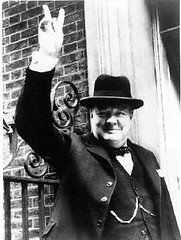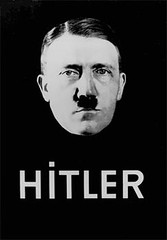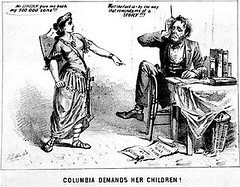Relativism, Leadership, and Pope John Paul
This post was intended to recapitulate arguments I made in earlier posts (here, here, here, and here, for instance) that I thought were lost forever in the Great Purge. I am reposting this because it contains new material and a handy summary of this continuing conversation so far.
--Monk
Correspondent Izmud said last month that the late Pope John Paul earned only middling grades--"yeah, you helped kill communism," he seemed to say, "but what have you done for me lately?"
Pope John Paul II may have been notable and respected for many of his achievements in his lifetime, most particularly in the international relations realm. However, IMO he also bungled the handling of the priest sex scandal cases, and his hard-line stance on modern social issues has led to a Church-admitted net loss of the faithful averaging 10-15,000 per month worldwide! While conservatives may agree with his stance on these issues, or admire his doggedness in refusing to bend to modern convention and liberalism, the bottom line is that his effectiveness as a leader of a group of people comes into question if his numbers are dropping rather than rising. So, a mixed report card overall for the late Pope.
Surely, Izmud, he earned at least a "B?"*
I agree that PJP II was “notable and respected for his achievements in international relations”--I would take that praise a step farther and say the he was one of the central figures of the last half of the twentieth century. He, along with Ronald Reagan, Margaret Thatcher, Lech Walesa, Vaclav Havel, and others of similar ilk, helped kill history’s bloodiest form of tyranny and one of Christianity’s most dangerous adversaries—the most verminous outgrowth (so far) of relativism as a philosophy.
All of that aside, however, I believe he deserves great praise for his handling of the doctrinal crisis that has beset Catholicism in the last fifty years and for his uncompromising stand against the “spirit of the age,” if you will: the latest incarnation(s) of moral relativism.
Gracia Grindal at A Lutheran Hymnal for Church and Home, put it quite well several weeks ago:
The reason for his success is not simply his brilliance, which was extraordinary, nor his genius at using the media to get out his message, which was astonishing, but most of all, his ability to lead by stating clearly and unwaveringly what it means to be Catholic today. Despite calls for him to adjust his message to the contemporary world, he stood firm. In contrast, we see the mainline Protestant churches in America tripping over themselves to be relevant and modern.
The evidence is in: it hasn’t worked…. When a church attempts to change its identity to fit with the times, it will lose.
This captures the soul of the matter, I think. In the wake of secular humanism’s seeming philosophical triumph, all of Christianity rushed to prove itself “relevant” to modern man—if its theology appeared to be irrelevant, it could still render useful social services or market a fuzzy-warm "product" that would make people feel good about themselves--enhance "self esteem," in the language of our age.
So from the New Frontier on, Christianity met the developed world with Presbyterian hootenannies, Vatican II, Methodism’s “you are loved” acceptance of everything, and the rise of “God on the gymnasium floor” congregation-pandering in the EvangiBaptist MegaChurches: “Do whatever steps you want if You have cleared them with the Pontiff …”
Bishops, Elders, and Deacons across Europe and North America, whether they wore lucre-encrusted vestments and tent-sized hats or sky-blue polycarbon suits and Brylcreemed DAs, thought that “Christianity must be “where it’s at” They must offer the “consumer” “choices”—-McChurch, if you will.
The churches that grew believers during this period were those that taught the right (as God gave them to see the right) and accepted the Holy Spirit’s inspiration and guidance. They may (or may not) have expressed the message in modern forms, but—bottom line—they did not compromise it (as the Catholic Church seems to have with many of the outcomes of Vatican II). They may have repelled some people who were more “of” the world than just “in” it, but such winnowing is not necessarily a bad thing.
And this brings us to the next issue: Izmud claims that it is a measure of the late Pope’s failure as a leader that the church lost “10-15,000 per month worldwide." First of all, this number is disputable, even if it did come from the Vatican. There is at least circumstantial evidence that it doesn't capture the whole picture. PJP II's part of the visible church may have lost absolute numbers, at least in the developed world, but he held fast to the essence of what it is to be a Catholic. I will be optimistic for a moment and assume that some of those 10-15,000 sought out a purer relationship with Christ and became Protestants. This was probably the case in the US. In Europe, sadly, those that fell away were probably lost altogether. But again, this is not all bad: the church has been tested by the spirit of the age like a military unit is tested in combat. Some fell in the battle. Many more deserted, but they were the weakest soldiers anyway. Those that remained were tested and proven--the Old Guard; the Grognards.
There’s a further issue here: is popularity (and the concomitant rise in supporters and poll numbers) really the best measure of leadership? If so, then this guy was the greatest leader of modern times:


Likewise, this guy


No, the real test of greatness in my mind is moral leadership: Is the leader willing to follow the right course, and guide those who will follow, regardless of what this does to his poll numbers? Note here that I say "moral" leadership--this presupposes that there is a "right course," according to some objective, absolute standard. There is no thought of ethical relativistic equivalency here--Hitler, after all, believed in his own carpet-chewing way that he was following the right path. John Paul II was following where God led him and was leading those who would follow down that path. This meant some would fall away, loving the world more than the Word--sad, but inevitable; one of the prices those who lead in God's paths must pay. The Grognards stayed with him, and eventually he began to attract others who bacame serious about growing in their faith.
And this brings us to the most important issue at hand: John Paul II was among the 20th Century's staunchest opponents of moral relativism--the prevailing mind and spirit of this age and several past (depending on how you reckon an "age"). Man has always lived with this tension: "is the universe centered on God, or on me?" Eve and Adam gave the latter answer, and sin entered the world. It's always been an option, but it was the particular genius of the Enlightenment and later eras to systematize this relativism as a philosophy and put the entire engine of modern science behind realizing it in various forms: "God is toppled from His throne--let's see who or what we can put in His place!"
At best, this philosophy has led people into rootless nihilistic anomie. More often, it has led into tyranny and dark savagery. Humanist relativism may seem pretty harmless in modern American, feel-good garb:
We are committed to treating each person as having inherent worth and dignity... Humanists strive toward a world of mutual care and concern [and] ... are concerned for the well being of all.
The result has been unprecedented disaster. Every time man has dethroned God and seized the crown for himself, as it were, he has created untold misery and mischief, regardless of how noble or utopian the words used to describe the “cause:”
Is man born free, but found everywhere in chains? Well then, let’s free him! Of course, a few recalcitrants may have to be “encouraged” to accept their liberte, egalite, & fraternite. Oh, and we’ll need a big, modern army to overthrow the oppressors in the rest of the still-benighted world. [The Terror, 12-17,000 killed without trial; wars of the Revolution and Napoleonic Wars, 1,000,000 – 1,750,000 killed.]
Is our national destiny the hope of the world? Why, it must be—just look at the glories of our culture, at all we have achieved! Of course, these glories prove that we are evolutionarily superior to all the verminous, rat-like peoples around us. We must “educate” them about our superiority! [15 – 16,000,000 killed in all social-Darwinist wars of national aggrandizement, from the Austro-Prussian War to World War I.]
Has mankind lost touch with a vital part of his soul? Lost an essential link to the dark looming forests or the ancient polis in the process of building civilization--a piece of deep Kultur from the dawn of time? Well then, let’s give him his soul back, suitably dressed up with all the trappings that modern media make possible. Oh, and all those “people” who can’t appreciate this ancient yearning—they’re no better than animals at best, fit only to be slaves to those who can. Never mind the damn Jews! [30 – 55,000,000 killed in the wars of fascism, esp. World War II.]
Is mankind oppressed by a wealthy exploiter class? Arise ye prisoners of starvation! Arise ye wretched of the earth! For justice thunders condemnation--A better world’s in birth! Oh, and those that don’t realize this yet—that stand in the way of the inevitable march of history—they’ll have to be “re-educated.” And who can really trust a kulak, or anyone over thirty, or someone who can read, anyway? [We don’t yet know how many died to institute “scientific socialism” in its various forms from the revolutions of the mid-19th Century until the fall of communism. Let’s see: around 1,000,000 dead in the 19th C.; about 9,000,000 dead in the Russian Civil War; 19,000,000 or so in Stalin’s purges and terror famine (14,000,000 in the Ukraine alone); post-WW II European “resettlement” and national “relocations,” about 2,100,000; the Chinese Revolution, about 2,500,000; in Mao’s purges, the Great Leap Forward, and the Cultural Revolution, between 41 – 46,000,000 (never mind aborted babies and girls left to die as part of national contraceptive policies); in Vietnam (all wars), about 2,500,000; in Democratic Kampuchea, around 2,000,000; in assorted communist-inspired “wars of national liberation” around the Third World, from 3 – 6,000,000; so over 80 million conservatively—and still counting— Cuba and North Korea (or even all the Chinese dead) have not been reckoned yet.]
The latter death toll alone is enough to make PJP II a hero (and an “A student”) by any reasonable standard due to his role in killing that beast. But he was also among the loudest and most articulate enemies of the root disease in all its forms. Today, it infects mostly the American and European Left—John Kerry is not so very different in outlook than Trotsky or Che. The “liberal” state government of California is not so very different than a post-WW II East European communist suzerainty like Poland or East Germany. The city government of San Francisco resembles Paris under the Commune. The average Hollywood entertainer is more extreme in ideology than the average late-communist dictator. The entire Visible Body of Christ in the US, Catholics included, can and should do more to fight the latest incarnation of this disease.
So, ultimately, Izmud is right about one aspect of PJP II’s ministry, but for the wrong reason, I think. The late Pope can be faulted for not coming to terms with the sex scandal in the US episcopate, but not because he rendered the church too stodgy and hidebound. I think, rather, that he didn’t go far enough—that the Catholic Church is not yet conservative enough, not sure enough of itself again as a unique institution, not free enough yet of the taint of modern relativism to take the steps necessary to prevent a recurrence of this type of scandal. When John Paul toook office, the Catholic Church was mired in Vatican II-inspired, Mackerel Plaza leftism. PJP II started a revolution. He replaced many leftist bishops and cardinals around the world, populating much of the upper echelons of the episcopate with men who thought like he did. He did not complete the revolution, however, and several of the most entrenched bastions of Catholic leftist relativism survive. One of those is the US episcopate, from the seminaries to the Council of Bishops. It is no coincidence that one of the most “liberal” bodies of priests in the world was also heavily infested with predatory pederasts. The former produced the latter, just like dung produces stink. When he was first made aware of the mess, the late Pope should have called CNN-I and broken the news himself, helped law enforcement prosecute those that betrayed their vocations to the uttermost extent of the law, and swept the US episcopate clean of leftist buggerers and the other “filth” that new Pope Benedict XVI referred to in his speech before the Papal Conclave several weeks ago. For his failure to carry the revolution far enough in his many years in service, PJP II is culpable—I agree.
The good news is that the new Pope was John Paul’s closest intellectual mentor back when he was a mere mortal. He understands what the church must do. I congratulate new Pope Benedict and hope he gets speedily to work, for the sake of all in the largest single slice of the Visible Body present on the earth.
* I know, Izmud: “No he didn’t and don’t call me Shirley!”
** It is a testimony to Britain’s decline as a great nation that Clement Atlee was recently rated the UK’s third greatest Prime Minister of the 20th C—two places ahead of the Iron Lady, but thankfully two behind Churchill. I guess all the pub rats and soccer hooligans know where their bread was originally buttered—Atlee gave them the modern British Nanny State.



